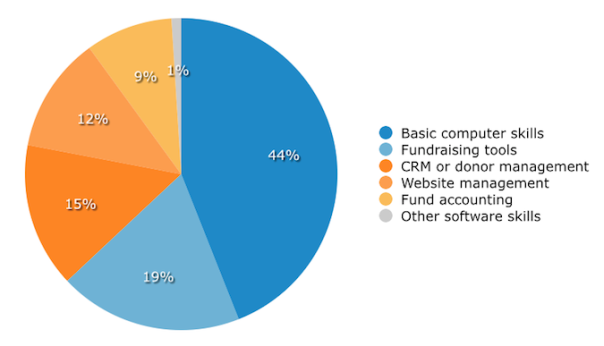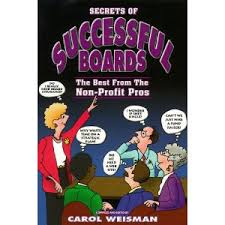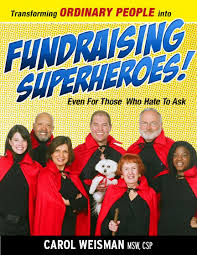 Do you know which skills and experiences are most important for a new board volunteer to possess in order to succeed on your board? Knowing this could help your organization conduct better prospecting exercises and result in better prospect recruitment lists. Today’s post is the third in a three part non-profit board development series that started last week. During this time, we focused on a recent survey released by our friends at non-profit technology research firm Software Advice of 1,545 board volunteers and people tasked with recruiting new board members. The survey’s key findings probably won’t surprise you, but the implications might change the way you think about your organization’s future board development efforts.
Do you know which skills and experiences are most important for a new board volunteer to possess in order to succeed on your board? Knowing this could help your organization conduct better prospecting exercises and result in better prospect recruitment lists. Today’s post is the third in a three part non-profit board development series that started last week. During this time, we focused on a recent survey released by our friends at non-profit technology research firm Software Advice of 1,545 board volunteers and people tasked with recruiting new board members. The survey’s key findings probably won’t surprise you, but the implications might change the way you think about your organization’s future board development efforts.
The final two findings of SoftwareAdvice.com’s survey that caught my eye related to skills and experiences. The first finding was:
“Basic computer skills (e.g. email, Excel, etc) are the most important technology skill for service (44 percent).“
The remaining 66% of responses were as follows:

The other finding was:
“Fundraising experience was the most cited (24 percent) skill set and experience that has the greatest impact on a board member’s success.“
The other responses included:

As I digested these final two findings, I immediately had two visceral reactions.
Was Carol Weisman wrong?
 If you haven’t heard Carol speak or read her books, then you need to figure out how to check those things off of your non-profit bucket list. She is amazing!
If you haven’t heard Carol speak or read her books, then you need to figure out how to check those things off of your non-profit bucket list. She is amazing!
When I read the study’s finding about “basic tech skills,” my mind immediately wandered back to a Boys & Girls Clubs of America conference hosted somewhere in the Midwest more than 10 years ago. Carol was one of the keynote speakers, and she was talking about building an amazing board of directors.
I remember her sitting on a stool on a large stage with a wireless lapel mic telling fun stories about non-profit boards and individual board volunteers. She was also likely promoting one of her many books. I was a relatively new and young non-profit executive director, and everything she said sounded right on target.
During Carol’s presentation, one of the things she talked about was how technology is changing non-profit boardroom dynamics. She shared a story about a board she had worked with that had embraced technology. If my memory serves me correctly, the following were just a few examples:
- Every board member was provided a laptop computer by the organization
- Board members received their board meeting agenda and info packet electronically
- Volunteer who were out of town for meetings would use their webcam and remotely attend and participate
 I am a member of GenX, and this news made my heart sing. I was so excited to hear that my Baby Boomer board could be transformed into that type of board. I came home from that conference with renewed focus and determination to figure out how tech can help my board become more engaged and efficient in governance.
I am a member of GenX, and this news made my heart sing. I was so excited to hear that my Baby Boomer board could be transformed into that type of board. I came home from that conference with renewed focus and determination to figure out how tech can help my board become more engaged and efficient in governance.
I started digitally scanning my board packets. I created an intranet site for the board. I uploaded board packets and other materials (e.g. policies, procedures, etc) to the intranet. Needless to say, no one followed me, and I abandon my tech efforts a year later.
The lesson learned was:
“You get the board you recruit!”
We had not recruited the board that Carol described in her conference keynote speech. My board development committee had not included “better-than-basic tech skills” as a skill set criteria. The result was that my board possessed basic tech skills related to the Microsoft Office productivity suite and email. They were light years away from going paperless and using Skype.
So, I guess Carol wasn’t “wrong” because tech will obviously change the boardroom experience, but . .
- change will likely take much longer than we thought (and will likely happen when GenX and Millennial board volunteers make up the majority on most boards)
- change will occur faster only if board development and board governance committees include tech skills in their search criteria when assembling their prospect lists
If you are looking for additional board development tools to add to your organization’s board development toolbox, then you should read a wonderful blog post by the National Council of Nonprofits and check out their hyperlinks to additional online resources. The post was titled “Finding the Right Board Members for Your Nonprofit“.
Fundraising experience is underrated
 When I read that only 25% of survey respondents identified “fundraising skills and experiences” as having a great impact on a board member’s success, I literally groaned and rolled by eyes.
When I read that only 25% of survey respondents identified “fundraising skills and experiences” as having a great impact on a board member’s success, I literally groaned and rolled by eyes.
Sure, it was the number one response, but it was still only one-quarter of respondents. As my 10-year-old niece would say . . .
“Really? Seriously?”
I suspect that fundraising might not be as important for non-profits that rely on fees and government money to buoy their business model, but the vast majority of non-profits with which I’ve worked aren’t hospitals and universities. Many non-profits have fundraising at the core of their business model, and it is one of the most difficult things I’ve seen board volunteers struggle with.
More oftentimes than not, when I’ve seen a board volunteer frustrated and on the verge of resigning, it usually has something to do with fundraising.
Of course, the solution is the same as I mentioned in the last section . . . “You get the board you recruit, and the board development committee needs to include fundraising skills and experiences in their search criteria.”
The tougher question is “what are fundraising skill and what should we be looking for?” My suggestion is to look for the following when going through prospect identification and evaluation exercises:
- people who donate to other charities and appear to have an appreciation for philanthropy
- people who are social and appear to have larger than average social networks
- people who have served on other non-profit board with a business model rooted in fundraising
- people who belong to service clubs that organize fundraising activities
- people who are passionate about your mission (e.g. are willing to walk across hot coals to achieve success for your organization)
- people who are well-versed at “closing the deal” in their professional lives (e.g. people who work in sales, banking, self-employed, etc)
- people who are assertive, persuasive, good communicators, relationship builders, etc.
Gail Perry speaks much more eloquently than I do on this subject. You might want to read her blog post titled “Mastering the ‘Soft Skills’ of Fundraising” and figure out if you can add any of those qualities to your board development prospect identification and evaluation process.
If you missed the earlier blog posts in this board development series, I encourage you to investigate the previous two posts from last week. You might also want to click-through and read SoftwareAdvice.com’s full survey report titled “Tech Skills and Other Considerations for Joining a Nonprofit Board IndustryView“.
What are your thoughts and experiences regarding tech and fundraising skills and experiences and your board of directors? Are you doing anything different now as part of your board development process that might help other non-profit professionals and volunteers re-think their approach? Please use the comment box below to share.
Here’s to your health!
Erik Anderson
Founder & President, The Healthy Non-Profit LLC
www.thehealthynonprofit.com
erik@thehealthynonprofit.com
http://twitter.com/#!/eanderson847
http://www.facebook.com/eanderson847
http://www.linkedin.com/in/erikanderson847
